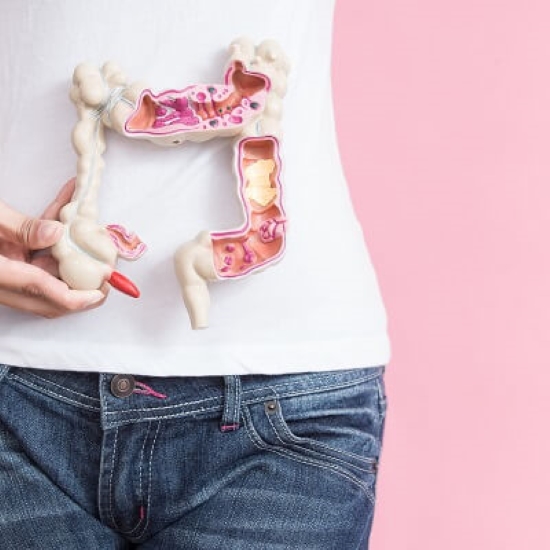The gastrointestinal tract represents the largest interface between the human organism and the external environment. The intestinal mucosal barrier plays an extremely important role, but its functioning is affected by disturbances of the digestive processes, absorption and metabolism. The intestinal barrier harmonises the physiological processes that enable normal homeostasis. Various environmental factors affecting the microbiota are at work in the intestinal lumen.[1] The location and density of microorganisms in the digestive tract vary both longitudinally (from oral cavity to rectum) and transversely (from epithelium to lumen). The composition and density of microbial colonisation is affected by pH, bile concentration, the accessibility of nutrients, the harmonious functioning of the immune system, and so on.[2] The greatest density of bacterial colonisation is in the large intestine, where it ranges from 1011 to 1012 bacteria per gramme, i.e. 60% of total faecal mass.[3] Water is secreted along the entire gastrointestinal tract from the duodenum to the lower part of the large intestine. The epithelium must be hydrated in order to function properly.

If the composition of the microbiota of the gastrointestinal tract is not correct, the signalling system of the microbiota–gut–brain axis can stop working properly, resulting in a change in bowel movements.[4, 5] The end products of bacterial fermentation can also affect bowel movements. It has been established that bowel movements are likewise influenced by the immune system, since new evidence is appearing of an inflamed reaction in some patients suffering from constipation. It is therefore extremely important to ensure proper digestion in patients suffering from disorders of the gut microbiome and in this way influence the qualitative and quantitative composition of the intestinal microbiota.
Studies (Bothe G., Čoh A., Auinger A., 2015, Indeykina L. K., 2018) have shown that Donat medicinal mineral water has an effect on the functioning of the gastrointestinal tract.[6, 7] Statistically significant results show that drinking 200 ml of medicinal mineral water three times a day for three weeks increases the rate of transfer of intestinal contents and normalises the frequency of evacuation. Donat acts as an osmotic laxative and facilitates the perfect functioning of the gall bladder, in this way stimulating the elimination of bile acids and the functioning of the pancreas and influencing enzyme formation.
Drinking Donat medicinal mineral water (from Rogaška Slatina in Slovenia) can therefore be recommended in the case of problems with regular evacuation of the bowels, since it can facilitate the comfortable existence of the microbial community in the intestines.

References
- Zhu H., Hart C.A., Sales D., Roberts N.B. Бактериальное убийство в желудочном соке – влияние рН и пепсина на Escherichia coli и Helicobacter pylori. J. Med. Микробиол., 2006, I. 55, P. 1265–1270.
- Tropini C., Earle K.A., Huang K.C., Sonnenburg J.L. Микробиом кишечника: подключение пространственной организации к функции. Cell Host Microbe, 2017, I. 21, P. 433–442.
- Sekirov I.,Russell S.L., Antunes L.C., Finlay B.B. Микробиота кишечника в здоровье и болезни. Физиол. REV., 2010, I. 90, P. 859–904.
- Kennedy P.J., Clarke G., Quigley E.M., Groeger J.A., Dinan T.G., Cryan J.F. Gut memories: towards a cognitive neurobiology of irritable bowel syndrome. Neurosci Biobehav Rev. 2012, I. 36, P. 310–340.
- Carabotti M., Scirocco A., Maselli M.A., Severi C. The gut-brain axis: interactions between enteric microbiota, central and enteric nervous systems. Ann Gastroenterol., 2015, I. 28, P. 203–209.
- Bothe G., Coh A., Auinger A. Efficacy and safety of a natural mineral water rich in magnesium and sulphate for bowel function: a double-blind, randomized, placebocontrolled study. Eur J Nutr 2015. (https://link.springer.com/article/10.1007/s00394-015-1094-8)
- Индейкина Л.Х. Оценка влияния лечебной минеральной воды Донат Магния (Donat) на моторно-эвакуаторную функцию толстой кишки у больных функциональными запорами / Л.Х. Индейкина, Е.С. Соколова, Н.Г. Самсонова, А.И. Парфенов // Доказательная гастроэнтерология. – №1. – 2018. – С. 59-60. (https://doi.org/10.17116/dokgastro20187155-110)
Choose chapter:






